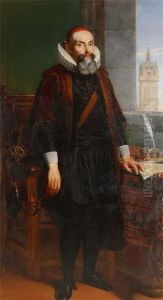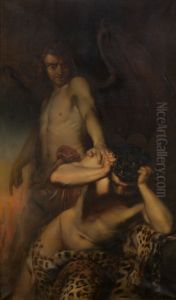Edward Dujardin Paintings
Édouard Dujardin was a French writer and art critic, born on November 10, 1861, in Saint-Gervais-la-Forêt, Loir-et-Cher, and he died on October 31, 1949, in Paris. He is often remembered for his contributions to the development of the stream of consciousness narrative technique, although he was not widely recognized during his lifetime for this innovation.
Dujardin's early career was marked by his involvement with the Symbolist movement, and he was associated with the literary and artistic journal 'La Revue indépendante,' which he co-founded in 1884. This publication was instrumental in promoting the works of Symbolist artists and writers. Dujardin's 1887 novel 'Les Lauriers sont coupés' is particularly notable for its use of interior monologue, which later influenced modernist writers such as James Joyce, who acknowledged Dujardin's impact on his own work, and others such as Virginia Woolf.
Apart from his literary endeavors, Dujardin was also involved in the theater and was a proponent of Wagnerian ideas in France. His interests were wide-ranging, including not only literature and drama but also the visual arts and cultural criticism. He wrote extensively on contemporary art and was engaged in the intellectual debates of his time, advocating for the appreciation of new forms of art and literature.
Dujardin's later years saw him continue his literary pursuits, although he never achieved the level of fame that some of his contemporaries did. He remained active in the cultural life of Paris up until his death in 1949. Despite the relatively modest impact he had during his lifetime, his innovations in narrative technique have secured him a place in literary history as a pioneer of the stream of consciousness method, influencing countless authors in the generations that followed.


